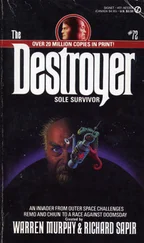‘I’m not trying to learn acceptance, Ms. Christman. I’m trying to find out what really happened to that airliner.’
‘It’s not unusual for people in your position to take refuge in conspiracy theories, Mr. Carpenter, because otherwise the loss seems so pointless, so random and inexplicable. Some people think we’re covering up for airline incompetence or that we’ve been bought off by the Airline Pilots’ Association and that we’ve buried proof the flight crew was drunk or on drugs. This was just an accident, Mr. Carpenter. But if I were to spend a lot of time with you on the phone, trying to persuade you of that, I’d never convince you, and I’d be encouraging you in this denial fantasy. You have my deepest sympathy, you really do, but you need to he talking to a therapist, not to me.’
Before Joe could reply, Barbara Christman hung up.
He called her again. Although he waited while the phone rang forty times, she did not answer it.
For the moment, he had accomplished all that was possible by telephone.
Halfway back to his Honda, he stopped. He turned and studied the side of the service station again, where the exaggerated and weirdly distorted shadows of moths washed across the white stucco, like nightmare phantoms gliding through the pale mists of a dream.
Moths to the flame. Three points of fire in three oil lamps. Tall glass chimneys.
In memory, he saw the three flames leap higher in the chimneys. Yellow lamplight glimmered across Lisa’s sombre face, and shadows swooped up the walls of the Delmanns’ kitchen.
At the time, Joe had thought only that a vagrant draft had abruptly drawn the flames higher in the lamps, though the air in the kitchen had been still. Now, in retrospect, the serpentine fire, shimmering several inches upward from the three wicks, impressed him as possessing greater importance than he previously realized.
The incident had significance.
He watched the moths but pondered the oil wicks, standing beside the service station but seeing around him the kitchen with its maple cabinetry and sugar-brown granite counters.
Enlightenment did not rise in him as the flames had briefly risen in those lamps. Strive as he might, he could not identify the significance that he intuited.
He was weary, exhausted, battered from the trauma of the day. Until he was rested, he could not trust either his senses or his hunches.
On his back in the motel bed, head on a foam pillow, heart on a rock of hard memory, Joe ate a chocolate bar that he’d bought at the service station.
Until the final mouthful, he could discern no flavour whatsoever. With the last bite, the taste of blood flooded his mouth, as though he had bitten his tongue.
His tongue was not cut, however, and what plagued him was the familiar taste of guilt. Another day had ended, and he was still alive and unable to justify his survival.
Except for the light of the moon at the open balcony door and the green numerals of the digital alarm clock, the room was dark. He stared at the ceiling light fixture, which was vaguely visible — and only visible at all because the convex disc of glass was lightly frosted with moonglow. It floated like a ghostly visitant above him.
He thought of the luminous Chardonnay in the three glasses on the counter in the Delmanns’ kitchen. No explanation there. Though Charlie might have tasted the wine before pouring it, Georgine and Lisa had never touched their glasses.
Thoughts like agitated moths swooped and fluttered through his mind, seeking light in his darkness.
He wished that he could talk with Beth in Virginia. But they might have her phone tapped and trace his call to find him. Besides, he was concerned that he would be putting Beth and Henry in jeopardy if he told them anything about what had happened to him since he’d found himself under surveillance at the beach.
Lulled by the maternal heart sound of the rhythmic surf, weighed down by weariness, wondering why he had escaped the plague of suicide at the Delmanns’ house, he slipped into sleep with nightmares.
Later, he half woke in darkness, lying on his side, facing the alarm clock on the nightstand. The glowing green numbers reminded him of those on the clock in Charles Delmann’s bloodied bedroom: time flashing backward in ten-minute increments.
Joe had supposed that a stray shotgun pellet must have struck the clock, damaging it. Now, in a swoon of sleep, he perceived that the explanation was different from what he had thought — something more mysterious and more significant than a mere bead of lead.
The clock and the oil lamps.
Numbers flashing, flames leaping.
Connections.
Significance.
Dreams reclaimed him briefly, hut the alarm woke him long before dawn. He had been out less than three and a half hours, but after a year of restless nights, he was refreshed even by this much sleep.
Following a quick shower, as Joe dressed, he studied the digital clock. Revelation eluded him now as it had eluded him when he Had been sotted with sleep.
Joe drove to LAX while the coast was still waiting for dawn.
He purchased a same-day, round-trip ticket to Denver. The return flight would bring him back to Los Angeles in time to keep the six-o’clock meeting with Demi — she of the sexy-smoky voice — at the coffee house in Westwood.
As he was on his way to the gate where his plane was already boarding, he saw two young men in blue robes at the check-in desk for a flight to Houston. Their shaved heads, the gold rings in their left ears, and their white tennis shoes identified them as members of the same cult as the group that he had encountered around the bonfire on the beach only hours earlier.
One of these men was black, the other was white, and both were carrying NEC laptops. The black man checked his wristwatch, which appeared to be a gold Rolex. Whatever their religious beliefs might be, they evidently didn’t take vows of poverty or have much in common with the Hare Krishnas.
Although this was the first time Joe had been aboard an aircraft since receiving the news about Michelle and the girls a year earlier, he was not nervous during the trip to Denver. Initially he worried that he would have an anxiety attack and begin to relive the plunge of Flight 353 as he had so often imagined it, but after just a few minutes, he knew that he would be all right.
He wasn’t apprehensive about dying in another crash. Perversely, if he perished in the same way that his wife and daughters had been taken, he would be calm and without fear on the long ride down into the earth, because such a fate would seem like a welcome return to balance in the universe, an open circle closed, a wrongness made right at last.
Of greater concern to him was what he might learn from Barbara Christman at the far end of his journey.
He was convinced that she didn’t trust the privacy of telephone conversations but would talk with him face-to-face. He didn’t think he had imagined the note of disappointment in her voice when she learned that he was not calling her from Colorado Springs. Likewise, her speech about the dangers of believing in conspiracy theories and the need for grief therapy, although compassionate and well stated, sounded to Joe as though it had been intended less for him than for the ears of eavesdroppers.
If Barbara Christman was carrying a burden that she longed to put down, the solution to the mystery of Flight 353 might be close at hand.
Joe wanted to know the whole truth, needed to know, but dreaded knowing. The peace of indifference would forever be beyond his reach if he learned that men, not fate, had been responsible for taking his family from him. The journey toward this particular truth was not an ascension toward a glorious light but a descent into darkness, chaos, the maelstrom.
Читать дальше












